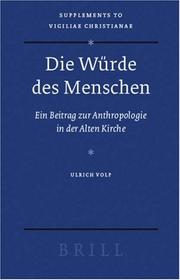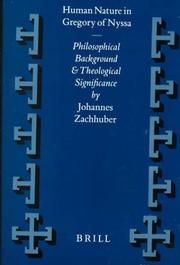| Listing 1 - 2 of 2 |
Sort by
|

ISSN: 0920623X ISBN: 9004154485 9789004154483 9786611400880 1281400882 9047411277 9789047411277 Year: 2006 Volume: 81 Publisher: Leiden Boston Brill
Abstract | Keywords | Export | Availability | Bookmark
 Loading...
Loading...Choose an application
- Reference Manager
- EndNote
- RefWorks (Direct export to RefWorks)
There can be no doubt that there is a link between early Christian statements on human dignity and the corresponding modern concept, as it appears ever more frequently in current bioethical debates. This study attempts to throw light on the surprisingly complex process of the emergence of such a Christian concept of human dignity in antiquity and portrays it as a process governed by contradictions and antagonisms: between biblical and platonic anthropology; between a platonic and a stoic perception of humanity; between gnostic and antignostic cosmology; between biblically based criticism of human culture on the one hand and heilsgeschichtlichem cultural optimism on the other hand; between Greek and Roman thinking. This history of the idea of the “dignity of man” is being recounted taking into consideration the complex matrix of Christian theory and practice (including issues such as worship, contraception and abortion), piety and theological reflection, ethics, liturgy and theological as well as cutural anthropology. *** Bei dieser Studie handelt es sich um den Versuch einer zusammenfassenden Darstellung der christlich-antiken Auseinandersetzung mit der Würde des menschlichen Lebens Diese wird nicht nur gegenwärtig etwa in der Bioethik wieder kontrovers diskutiert, sondern ist auch in der Antike ein Feld philosophischer und theologischer Überlegungen gewesen. Volp fragt, inwieweit sich in den Schriften der antiken christlichen Denker die Vorstellung einer mit einer besonderen Würde ausgestatteten gemein-menschlichen Natur findet, die Menschen von Tieren und von belebter und unbelebter Materie unterscheidet, und wie diese Natur gefaßt und begründet wird. Ausgehend von der These, daß diese Überlegungen nicht nur Auswirkungen auf die ethische und religiöse Praxis der Alten Kirche hatten, sondern umgekehrt auch entscheidend von ihr geprägt wurden, konzentriert sich die Arbeit nicht nur auf die theoretischen Äußerungen der Kirchenväter, sondern bezieht ethische Konkretionen (Schwangerschaftsabbruch, Umgang mit Menschen mit Behinderungen, Krieg) und den christlichen Kult mit in die Untersuchung ein. Zum Vorschein kommt ein überraschend komplexes Bild einer alles andere als selbstverständlichen geistesgeschichtlichen Entwicklung, deren Folgen bis in die heutige Zeit nachwirken.
Theological anthropology --- Dignity --- Christianity --- History of doctrines --- Religious aspects --- 233 --- De mens. Theologische antropologie --- Human dignity --- Values --- Man (Theology) --- Primitive and early church, ca. 30-600 A.D. --- Theological anthropology - Christianity - History of doctrines - Early church, ca 30-600. --- Dignity - Religious aspects - Christianity - History of doctrines - Early church, ca. 30-600.

ISSN: 0920623X ISBN: 9004115307 9004274324 9789004115309 9789004274327 Year: 2000 Volume: 46 Publisher: Brill
Abstract | Keywords | Export | Availability | Bookmark
 Loading...
Loading...Choose an application
- Reference Manager
- EndNote
- RefWorks (Direct export to RefWorks)
This volume explores Gregory Of Nyssa's concept of human nature. It argues that the frequent use Gregory makes of phusis -terminology is not only a terminological predilection, but rather the key to the philosophical and theological foundations of his thought. Starting from an overview of the theological landscape in the early 360's the study first demonstrates the meaning and relevance of universal human nature as an analogy for the Trinity in Cappadocian theology. The second part explores Gregory's use of this same notion in his teaching on the divine economy. It is argued that Gregory takes this philosophical theory into the service of his own theology. Ultimately the book provides an example for the mutual interaction of philosophy and Christian theology in the fourth century.
Theological anthropology --- Christianity --- History of doctrines --- 276 =75 GREGORIUS NYSSENUS --- Man (Christian theology) --- -Man (Christian theology) --- Griekse patrologie--GREGORIUS NYSSENUS --- -Gregory of Nyssa, Saint --- -Contributions in Christian doctrine of man --- Gregory, --- -Griekse patrologie--GREGORIUS NYSSENUS --- Ghirīghūriyūs, --- Grégoire, --- Gregor, --- Gregori, --- Gregorio, --- Grēgorios, --- Gregorius, --- Grigoli, --- Grigoriĭ, --- Grzegorz, --- Qiddīs Ghirīghūriyūs Usquf Nīṣṣ, --- Grigorije, --- Gregorius Nyssenus --- Gregor von Nyssa --- Gregorio di Nissa --- Gregorius van Nyssa --- Gregory of Nyssa --- Grégoire de Nysse --- Contributions in Christian doctrine of man. --- Humanities --- The Early Church --- Theological anthropology - Christianity - History of doctrines - Early church, ca 30-600.
| Listing 1 - 2 of 2 |
Sort by
|

 Search
Search Feedback
Feedback About
About Help
Help News
News